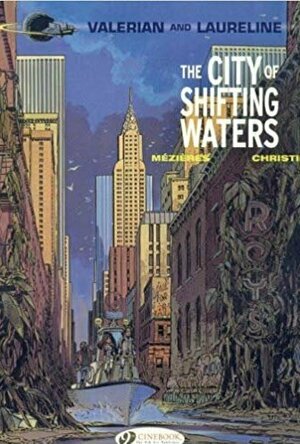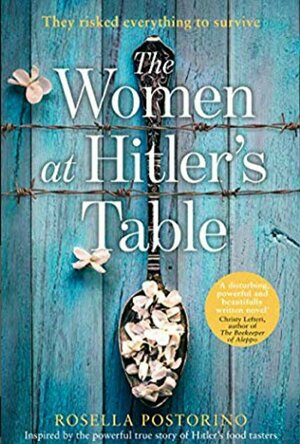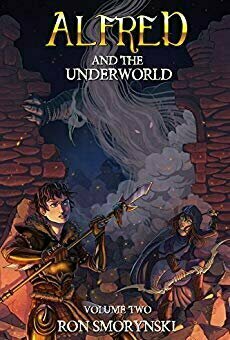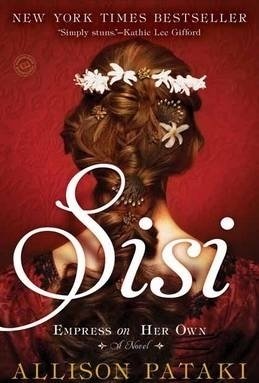EmersonRose (320 KP) rated The City of Shifting Waters (Valérian and Laureline, #1) in Books
Nov 20, 2019
The Valerian and Laureline comics follow Valerian, a handsome and cocky time and space traveler, and Laureline, his stubborn and beautiful partner. They travel together across space and time on missions for Galaxity, the capital of the Terran Empire in the 28th century. They explore strange worlds with fascinating creatures, deal with complicated political situations, and take the reader through rewritten history.
I immediately fell in love with the comics for the same reasons I enjoyed the film. The first is that the world that author Pierre Christin and artist Jean-Claude Mezieres created is truly fantastical. It falls under the same sci-fi mixed with fantasy genre that Star Wars is under. The great space galaxy is full of planets that are home to a wide range of alien species, each with complicated politics, cultures, and aesthetics.
The second reason is that I love the relationship between Valerian and Laureline. I am a very character driven person in both my reading and writing so I am a sucker for a good relationship, romantic, familial, or friendship. Valerian and Laureline start the first comic playing chess. Valerian is cocky and does not like to lose, but he is kind and smart and works hard to make the world a better place. Laureline is funny, stubborn, and unlike Valerian, she does not feel the same sense of loyalty to the Terran Empire and therefore is okay with bending the rules to save the most people. They make for a great team, and their fun banter adds to the overall charm of the story.
7810429The first issue of the series was released in 1967 and ran till 2010. Initially, all were written in French but has since been translated into English and several other languages. This series plays with a lot of the sci-fi/fantasy tropes that make you fall in love with stories in the genre, and has even been compared to Star Wars as the basis for several of the ideas used in the Star Wars films, such as the look of some of the characters and situations characters find themselves in.
This is a fun and exciting comic series that got me into reading101694 comics in the first places. I will certainly be continuing my reading of these books so that I can continue being apart of the Valerian and Laureline story. I also enjoyed the film and hope that the passion the Luc Besson showed will be enough to allow him to make another film in the series.
I would highly recommend this series!

Angewandte Chemie International Edition
Education and Magazines & Newspapers
App
A leading chemistry journal is now available on your iPad and iPhone. Fresh from the newsstand,...

English Spanish Dictionary G.
Reference and Education
App
WORKS OFFLINE With over 718,000 entries, 524,000 translations, 558,000 synonyms, 98,000 definitions...
ClareR (6067 KP) rated The Women at Hitler’s Table in Books
Dec 3, 2019
Rosa Sauer moves from Berlin to live with her husbands parents in the countryside, to escape the bombs that killed her parents. However, in doing so she draws attention to herself and ends up being ‘enlisted’ by the SS as one of the female food tasters at the Wolfschanze (Wolfs Lair). In some ways this is a privileged position - food is scarce and people are starving. Rosa and her fellow food tasters are guaranteed regular food, but each meal could be their last. They have no choice but to eat: SS guards watch their every mouthful. Some of the women are Hitler loyalists and see it as an honour to do this, whilst others (Rosa included) aren’t as keen. Rosa is beginning to see the cracks in the regime, and in fact has disagreed with the party’s politics for a long time. But she has chosen not to do or say anything - as many people did.
This book looks at what life was like for the ordinary Germans. Their loves, loyalties, secrets and the fear for both their present circumstances and their futures. This isn’t a comfortable read. It looks at some very unsettling subjects, and the fear of the women is palpable. I think the story would have stood up well without the romance element, but I’m sure some would disagree with me and would enjoy that aspect more.
I really liked the links with real historical figures: Claus Von Stauffenberg, some local nobility and a real food taster that the story was based on (Margot Wölk). I also liked the style in which this was written. It was dark, subdued, much like how I imagine the country felt as a whole at this point. I really did enjoy this book - it was an interesting and new angle to look at a period in history which we all feel that we know a lot about. Just when you thought you’d seen it all, Hitler’s female food tasters make their appearance....
Many thanks to NetGalley and Harper Collins for my copy of this book to read and review.

Lonely Planet South Africa, Lesotho & Swaziland
Lonely Planet, James Bainbridge, Lucy Corne and Jean-Bernard Carillet
Book
Lonely Planet: The world's leading travel guide publisher Lonely Planet South Africa, Lesotho &...

Kingsdown Sundown by Will Varley
Album
With the follow-up to the stellar Postcards From Ursa Minor, an album that propelled Will into...
EmersonRose (320 KP) rated Alfred: And The Underworld in Books
Nov 20, 2019
Alfred and the Underworld is the second volume of Alfred: The Boy King series by author Ron Smorynski. Published on November 2017, this book continues Alfred’s journey as the King of Westfold. After spending some time back with his mother in the human world researching and preparing, he goes back to his people. Things are not going well, and Alfred has a lot of work to do to help his people get back on their feet and defend themselves from the darkness that surrounds them.
In this book, Smorynski continues not only with this adventure-filled story but has continued to build up his fantasy world. Alfred encounters several new magical creatures, both good and bad around his kingdom. We also get a further building of the magical system and who has access to magic, which adds to the world and what is possible within it. Another interesting aspect was the history and politics that took a forefront position in this book. We are given a better grasp of the world outside of Alfred’s little kingdom. There are more players in the game now some that could be allies and some that have allied themselves with the evil in the land.
I really enjoyed that in this book we get to see different perspectives. While mostly told from Alfred’s point of view, we also get sneak peaks into both his mother’s mind and the enemies Alfred, and his people are fighting. This was interesting because these other characters are privy to information Alfred does not have access to and helps build the intrigue of the story. I particularly liked the chapters focused on Alfred’s mother. Through the excitement of Alfred building up his kingdom and the thrill of preparing for battle and defeating enemies, the mother is a reminder of a big picture and a deeper mystery. Throughout the first book we were given pieces of the life that she left behind when she brought Alfred to our world, and slowly those pieces are coming together.
I greatly enjoyed this book and am excited about the third book in the series Alfred and the Quest of the Knights. Alfred and the Underworld was an exciting, fun, and interesting story on its own, but it also set up nicely for the next installment. Between the big bad that is Gorbogal the witch and the truth bomb that was dropped on Alfred in the last sentence as a cliffhanger, this book as left me desperately waiting for more.
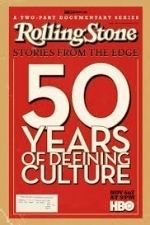
Rolling Stone: Stories from the Edge
TV Show Watch
Directed by Oscar-winner Alex Gibney (HBO’s Taxi to the Dark Side and Going Clear: Scientology and...
graveyardgremlin (7194 KP) rated Sisi: Empress on Her Own: A Novel in Books
Feb 15, 2019
I commend the author in all the research she did as I think she did an astounding job bringing Sisi to life, showing both her strengths and weaknesses. Most everything was brought to life in a way that was easy to visualize. However, in this book I found there to be more telling than showing as far as politics go, which could be a tad boring, plus I felt there were redundancies here and there. I didn't notice any major anachronism other than one phrase that jolted me out of the book that I dearly hope is not in the final edition (<a href="https://en.m.wikipedia.org/wiki/Long_time_no_see"; targeet="_blank">"Long time no see."</a> if interested). The author provides a thorough section where she notes what was taken from history, leaving me to conclude what must be fiction. I found the fictional parts to be either likely or at least not implausible, excepting a couple incidents in Rudolf's (Sisi's son) youth that felt odd. I won't even touch on Sisi as a person, she's too complex and confounding to decribe in few words, but I felt that Pataki did the best she could at humanizing her while remaining true to her historical record.
Sisi (and the aforementioned The Accidental Empress) are a worthwhile addition to the genre that show a royal family not much touched upon in historical ficiton.

Lonely Planet Eastern USA
Lonely Planet, Amy C. Balfour, Adam Karlin and Karla Zimmerman
Book
#1 best-selling guide to Eastern USA Lonely Planet Eastern USA is your passport to all the most...
